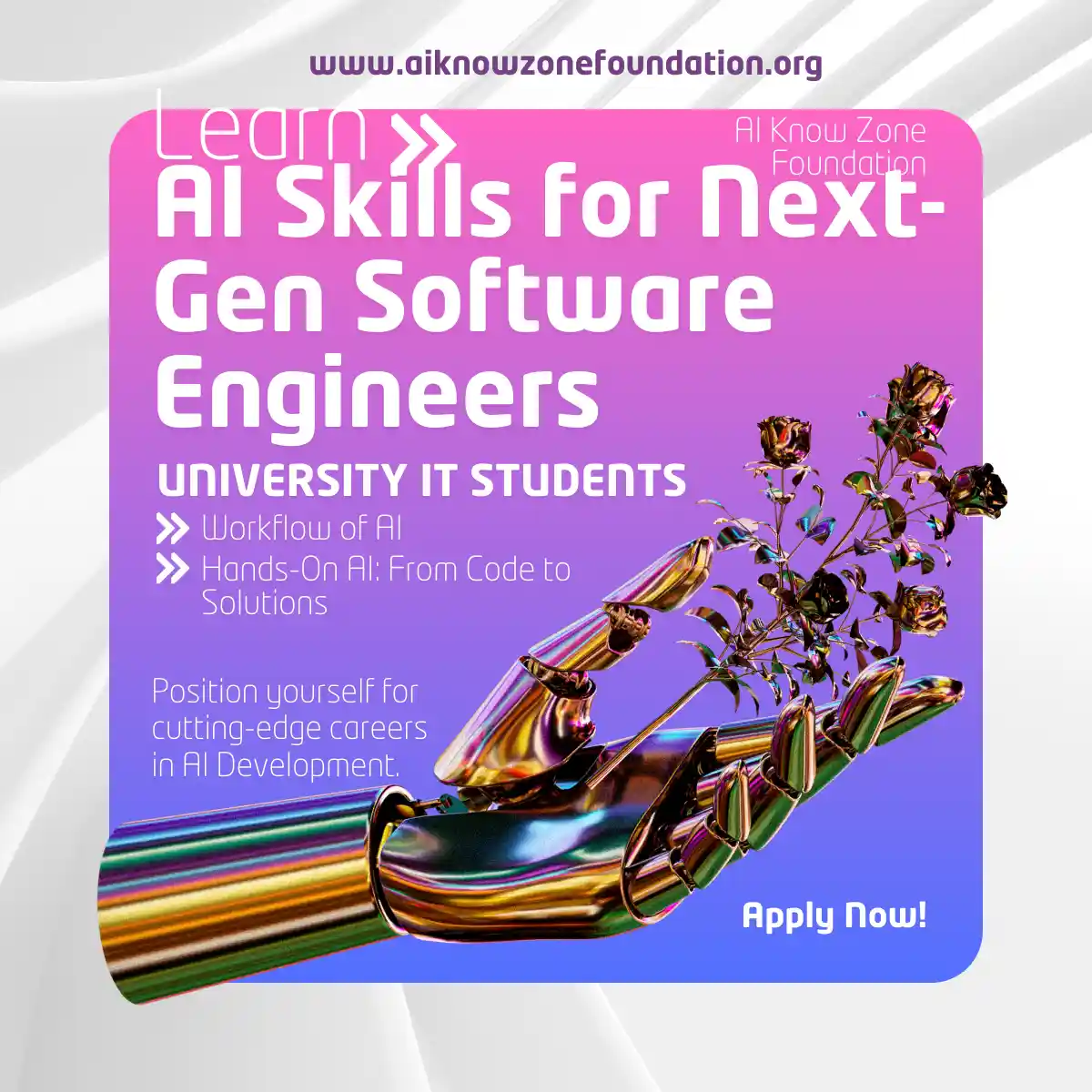AI Developer Bootcamp for Kenyan University Students
Hands-on training in AI tools, machine learning, and real-world problem solving for future software engineers
Vision: To equip the next generation of Kenyan tech talent with practical, industry-relevant skills in Artificial Intelligence development, enabling them to build scalable, real-world solutions and compete in the global digital economy.
Target Audience: University students in Kenya (2nd year and above) in Computer Science, Software Engineering, IT, or related fields with basic programming knowledge (preferably Python).
Learn to design, build, and deploy AI-powered solutions while gaining skills that set you apart in the IT industry.

Prerequisites:
- Basic proficiency in Python programming.
- Understanding of fundamental programming concepts (variables, loops, functions, OOP).
- Access to a computer with a reliable internet connection.
- No prior AI/ML knowledge is required.
Delivery Mode: Live Online (Zoom/Teams) + Asynchronous Learning (LMS like Moodle/Canvas)
- Schedule: Evenings and Weekends to accommodate academic timetables.
- Duration: 40 hours (Intensive)
Capstone Project: Students will conceptualize, develop, and present a full-stack AI application that addresses a local Kenyan challenge (e.g., in agriculture, finance, healthcare, language translation, etc.).
Full Course Outline
Module 0: Pre-Bootcamp Onboarding
- Objective: Ensure all students are set up with the necessary tools and foundational knowledge.
Topics:
- Environment Setup: Python, Jupyter Notebooks, VS Code, essential libraries (NumPy, Pandas).
- Git & GitHub Crash Course: Creating a repository, commits, pushing, and pulling.
- Introduction to the Bootcamp LMS and communication channels (Slack/Discord).
- Basic Python Refresher (asynchronous materials).
Module 1: Foundations of AI & Machine Learning
- Objective: Build a strong conceptual understanding of core AI/ML concepts before diving into code.
Topics:
- What is AI, ML, and Deep Learning? The difference and the landscape.
- Types of Machine Learning: Supervised, Unsupervised, Reinforcement Learning.
- Hands-on Coding: Data Preprocessing with Pandas and Scikit-Learn (handling missing data, categorical data, feature scaling).
- Hands-on Coding: Building Your First ML Model (Linear/Logistic Regression) with Scikit-Learn.
- Model Evaluation Metrics: Accuracy, Precision, Recall, F1-Score, Confusion Matrix.
Module 2: Introduction to Deep Learning & Neural Networks
- Objective: Understand and implement basic neural networks using modern frameworks.
Topics:
- Fundamentals of Neural Networks: Neurons, Layers, Activation Functions, Loss Functions.
- Introduction to TensorFlow & Keras / PyTorch (We will choose one as primary, introduce the other).
- Hands-on Coding: Building a Deep Learning Model for Image Classification (e.g., MNIST dataset).
- Training Dynamics: Understanding Epochs, Batch Size, and Optimizers.
- Code Review & Debugging: Common errors in building NN architectures and how to fix them.
Module 3: Software Architecture & Development Workflow for AI
Objective: Teach professional practices for building maintainable and scalable AI projects.
Topics:
Software Architecture for AI:
Structuring an AI Project: The `src`, `data`, `models`, `notebooks` convention.
- Model Versioning and Reproducibility: Introduction to MLflow or Weights & Biases.
- Designing modular and reusable code (separating data loading, preprocessing, model definition, and training).
Development Workflow:
- Advanced Git: Branching strategies (GitFlow), Pull Requests, and code collaboration.
- Code Testing for AI: Unit testing data pipelines and model inference code.
- Introduction to CI/CD pipelines for AI (GitHub Actions).
Module 4: Consuming AI – API Integration & Deployment
Objective: Learn to leverage powerful pre-built AI models and deploy your own.
Topics:
API Integration Workshops:
- RESTful API Fundamentals (HTTP requests, status codes, JSON).
- Integrating Cloud AI APIs: OpenAI GPT (for text generation/Chatbots), Google Cloud Vision (for image analysis), or similar.
- Specific to Kenya: Exploring and integrating relevant African/ Kenyan APIs (e.g., African Language NLP APIs, mobile payment APIs like M-Pesa for AI apps).
Deployment Practices:
- Introduction to Cloud Platforms (Google Cloud Platform / AWS / Azure – free tier focus).
- Building a Simple REST API for your model using FastAPI .
- Containerization Basics: Dockerizing an AI application.
- Deploying a model to a cloud service (e.g., Hugging Face Spaces, Heroku, or GCP Cloud Run).
Module 5: Building End-to-End AI Applications
Objective: Synthesize all learned skills to build and present a complete, functional application.
Topics:
Frontend Integration:
- Building a simple web interface with Streamlit (highly recommended for rapid prototyping) or Flask.
- How to connect a frontend to a trained model or an API.
Project Ideation & Scoping: Brainstorming projects relevant to the Kenyan context.
End-to-End Project Development:
- Teams will work on their capstone projects.
- Weekly stand-ups and dedicated mentor support.
- Live Coding Sessions: Instructors will build a sample project from scratch, demonstrating problem-solving, debugging, and integration.
* Final Presentation Preparation.
Module 6: Demo/Hackathon Day & Career Preparation
Objective: Showcase work and prepare students for the job market.
Topics:
- Capstone Project Demo Day: Live presentations to peers, instructors, and invited Kenyan tech industry guests.
- Building a Tech Portfolio: How to showcase your AI projects on GitHub and LinkedIn.
- The Kenyan AI Landscape: Guest speaker(s) from the local AI/tech ecosystem.
- Next Steps: Resources for continued learning, contributing to open source, and preparing for AI interviews.
Pedagogical Approach & Key Features
Project-Based Learning: Every module has a small project leading to the final capstone.
- “Build in Public”: Students will use GitHub from day one, creating a portfolio of their work.
- Live, Interactive Sessions: Not just lecture-based. Sessions will be heavily focused on live coding, with students encouraged to code along.
- Mentorship: Teaching Assistants (TAs) will be available for code reviews and to help with debugging.
- Community: A dedicated Slack/Discord workspace for collaboration, asking questions, and networking.
- Local Relevance: Case studies, project ideas, and data sets will be chosen for their relevance and potential impact in Kenya and Africa.
Required Tools & Technologies
Programming Language: Python
- Frameworks/Libraries: TensorFlow, Scikit-Learn, Pandas, NumPy, OpenCV
- Web & APIs: FastAPI, Streamlit, Flask, Requests library
- Development & DevOps: Git, GitHub, Docker, VS Code
- Cloud & Deployment: Heroku, or a major cloud provider (GCP/AWS/Azure)
- Communication: Slack/Discord, Zoom, Google Meet, Whatsapp

